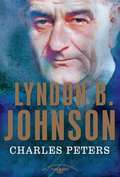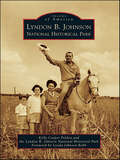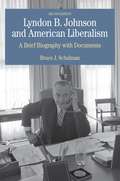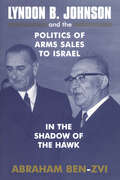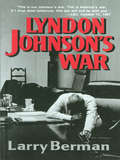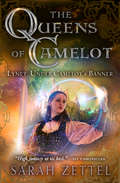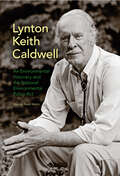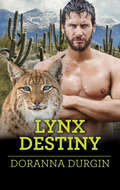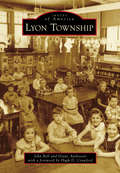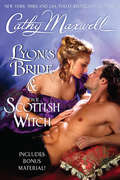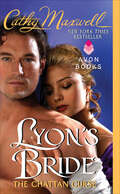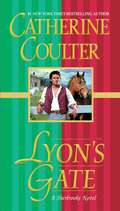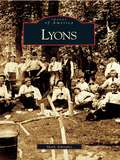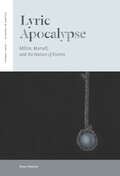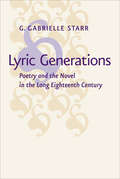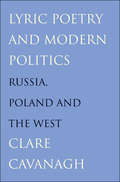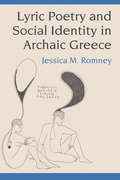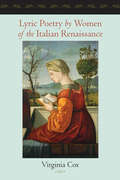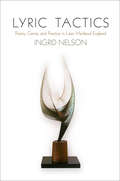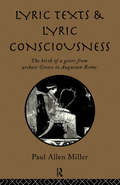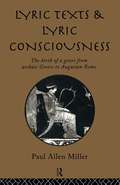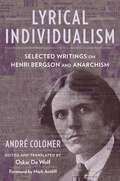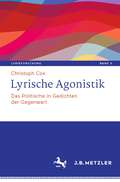- Table View
- List View
Lyndon B. Johnson (The American Presidents Series)
by Arthur M. Schlesinger Charles PetersPeters, a keen observer of Washington politics for more than five decades, shares his insider knowledge and experiences to tell the story of Johnson's presidency as the tale of an immensely talented politician driven by ambition and desire.
Lyndon B. Johnson National Historical Park
by Kelly Carper Polden Lyndon B. Johnson National Historical Park Lynda Johnson RobbPres. Lyndon B. Johnson took pride in his heritage and in the Texas Hill Country roots of his pioneer ancestors. He delighted in showing guests the ancestral settlement, and his birthplace, boyhood home, and the family treasure: the LBJ Ranch and the home that became known as the Texas White House. LBJ generously gifted these cherished assets to the people of the United States. Lyndon B. Johnson National Historical Park holds more assets significant to an American president than any other U.S. presidential site. Visitors may stroll through the Johnson Settlement, stepping back in time to the 1860s, when President Johnson�s ancestors helped settle Johnson City, which was named after James Polk Johnson, nephew to LBJ�s grandfather. The Boyhood Home and Visitor Center are located close to the Johnson Settlement, and visitors can tour the reconstructed Birthplace and enjoy a scenic drive through the LBJ Ranch before touring the Texas White House. This book illustrates the significance of LBJ�s heritage and the circle of life represented by what is both a birthplace and a final resting place.
Lyndon B. Johnson and American Liberalism: A Brief Biography With Documents (Bedford Series in History and Culture )
by Bruce J. SchulmanWhether admired or reviled, Lyndon B. Johnson and his tumultuous administration embodied the principles and contradictions of his era. Taking advantage of newly released evidence, this second edition incorporates a selection of fresh documents, including transcripts of Johnson's phone conversations and conservative reactions to his leadership, to examine the issues and controversies that grew out of Johnson's presidency and have renewed importance today. The voices of Johnson, his aides, his opponents, and his interpreters address the topics of affirmative action, the United States' role in world affairs, civil rights, Vietnam, the Great Society, and the fate of liberal reform. Additional photographs of Johnson in action complement Bruce J. Schulman's rich biographical narrative, and a chronology, an updated bibliographical essay, and new questions for consideration provide pedagogical support.
Lyndon B. Johnson and the Politics of Arms Sales to Israel: In the Shadow of the Hawk (Israeli History, Politics And Society Ser.)
by Abraham Ben-ZviLyndon B. Johnson and the Politics of Arms Sales to Israel seeks to reconstruct and elucidate the processes behind the decisions made by the Johnson Administration during the years 1965-68 to sell Israel M-48 tanks, A-4 Skyhawk planes and F-4 Phantom planes. This examination is based on a distinction between three factions which competed for influe
Lyndon B. Johnson and the Transformation of American Politics (Library of American Biography Series)
by John BullionThis newest edition to the Library of American Biography Series by John L. Bullion introduces students to the dynamic and turbulent life and legacy of President Lyndon B. Johnson. <P><P>Johnson navigated the country through some of the most challenging issues of the 20th century. This volume offers a close look at not only how Johnson handled the issues of civil rights, segregation, Vietnam, and an unruly economy, but also demonstrates how these same issues and events wore away Johnson’s once robust idealism. <P><P>The titles in the Library of American Biography Series make ideal supplements for American History Survey courses or other courses in American history where figures in history are explored. Paperback, brief, and inexpensive, each interpretative biography in this series focuses on a figure whose actions and ideas significantly influenced the course of American history and national life. At the same time, each biography relates the life of its subject to the broader themes and developments of the times.
Lyndon Johnson's War: The Road to Stalemate in Vietnam
by Larry Berman"Stunning....The portrait of the embattled and unyielding president that emerges is vivid and memorable."--Publishers Weekly By 1968, the United States had committed over 525,000 men to Vietnam and bombed virtually all military targets recommended by the joint Chiefs of Staff. Yet, the United States was no closer to securing its objectives than it had been prior to the Americanization of the war. The long-promised light at the end of the tunnel was a mirage. This absorbing account reveals the bankruptcy of the bombing campaign against North Vietnam, the failures of political reform in South Vietnam and the bitter bureaucratic conflicts between the US government and its military commanders.
Lynet: Under Camelot's Banner (The Queens of Camelot #3)
by Sarah ZettelA maiden fights to bring peace to Arthurian England in this romantic fantasy from an award-winning author. Love finds a way in this epic series featuring swords, sorcery, and the women of Camelot. The daughter of the steward of Cambryn, Lynet has seen the damage that following one’s heart can do. Now the threat of war looms over her land. Desperately searching for a way to restore peace to her home and honor to her family, Lynet and her sister decide that Lynet will seek the help of the last heir to the ancient royal house of Cambryn: the High Queen Guinevere. In Camelot, Gareth, squire of Sir Lancelot, is filled with pride and swagger. But when a potential war calls Queen Guinevere to Cambryn, Gareth finds himself in the company of a young woman who has no patience for his shows of bravado, and for the first time in his life Gareth finds himself with something real to prove. The love growing between Gareth and Lynet is undeniable, but so is the danger into which they are drawn. Only if they come to terms with their pasts and learn to trust again will they be able to overcome the festering darkness threatening to consume them both. Praise for the Queens of Camelot series “High fantasy at its best.” —SFF on Lynet: Under Camelot’s Banner “This novel delivers passion, danger, and excitement laced with fantasy.” —RT Book Reviews on Risa: In Camelot’s Shadow “A spellbinding journey.” —BookLoons Reviews on Elen: For Camelot’s Honor
Lynton Keith Caldwell: An Environmental Visionary and the National Environmental Policy Act
by Wendy Read Wertz“A solid overview of both Caldwell’s contributions and the development of the environmental movement in the US . . . . Recommended.” —ChoiceThis is the story of a visionary leader, Lynton Keith Caldwell, who in the early 1960s introduced the study of the environment and environmental policy at a time when such areas of expertise did not exist. Caldwell was a principal architect of the National Environmental Policy Act of 1969 and is recognized as the “inventor” of the Act’s important environmental impact statement provisions, now emulated around the world. For the next three decades, Caldwell played a leading role in establishing ethics-based environmental policy and administration as major areas of inquiry in the United States and around the world. Through his tireless global travels, writing, and lectures, and his work with the US Senate, the IUCN, UN, and UNESCO, Caldwell became recognized for his contributions to environmental ethics and the development of strong environmental planning and policy. This engrossing biography is based on interviews the author conducted with Caldwell and on unrestricted access to his memorabilia, photos, and records.“Deeply insightful . . . The field of environmental policy is richer for this addition. —H-Net Reviews
Lynx Destiny
by Doranna DurginA lone shifter and a stranger must embrace their deepest fears to defeat a deadly enemy. Forced to return to her family cabin deep in the Sacramento Mountains, Regan Adler is determined to keep her visit brief. Voices that drove her mother crazy are now threatening to do the same to her and she can't ignore them. Then she meets Kai. . . . Kai Faulkes is a lone shape-shifter who takes the form of a lynx. He's aware of the danger approaching but when Regan's soft and sultry voice reaches him, he is thrown into a whole new world of passion that can never be claimed until their common enemy is destroyed! A lynx shifter romance. Previously published.
Lyon Township
by John Bell Hugh D. Crawford Diane AndreassiLyon Township and the unincorporated hamlet of New Hudson are nestled in the southwest corner of Oakland County. They have a rich history of agricultural production. Early 20th-century records show that farmers and families socialized closely with their neighbors in the nearby village of South Lyon when the hard work of the day was done. New Hudson supported two general stores, a tavern, a post office, schools, and churches. However, the start of the I-96 expressway in the 1950s took commuters off the streets and away from local businesses, causing some to close. By the 21st century, the tides turned again, when the proximity to the expressway brought attention to the community and heralded in a new construction boom, earning Lyon Township the distinction in 2012 as one of Michigan's fastest-growing communities.
Lyon's Bride and The Scottish Witch with Bonus Material
by Cathy MaxwellTwo great full-length novels in The Chattan Curse series together in one set from NY Times bestselling author Cathy Maxwell. Includes never before seen "behind the book" info, photos from the author, and a sneak peek to her next series The Brides of Wishmore. Fans of Karen Hawkins, Sabrina Jeffries, and Eloisa James will enjoy these utterly romantic and unforgettable books set in Regency England and Scotland. Lyon's Bride They call him Lord Lyon…proud, determined and cursed. He is in need of a bride, but if he falls in love it's is said he will die. So he seeks a woman to marry without love, hoping to break the curse of the Chattans forever. Enter beautiful Thea Martin—a duke's headstrong, errant daughter and society's most brilliant matchmaker. Years ago, she and Lyon were inseparable, until he disappeared without a word. Now she is charged with finding him his bride—a woman he must not love, for a man Thea could love all too well. The Scottish Witch Portia Maclean believes she is beyond love and marriage. Then, one moonlit night, she finds herself swept off her feet by a powerful stranger. But what will he do once he discovers she's betrayed him? Harry Chattan is fighting for his family…he's come to Scotland on the hunt for a witch to break the Chattan curse. Instead, he finds himself bewitched by Portia. Harry has vowed to fight the demons torturing him, but will that battle destroy her as well?
Lyon's Bride: The Chattan Curse (Chattan Curse Ser. #1)
by Cathy MaxwellA London matchmaker is charged with finding the man she loves a wife in this “delightful” Regency romance from a New York Times bestselling author (Publishers Weekly).“When a Chattan male falls in love, strike his heart with fire from above . . .”They call him Lord Lyon, proud, determined —and cursed. He is in need of a bride, but if he falls in love, he dies. His fervent hope is that by marrying —and having a son—without love, perhaps he can break the curse’s chains forever.Enter beautiful Thea Martin—a duke’s headstrong, errant daughter and society’s most brilliant matchmaker. Years ago, she and Lyon were inseparable, until he disappeared from her life without a word. Now she is charged with finding Lyon’s bride—a woman he cannot love for a man Thea could love too well.
Lyon's Gate: Bride Series (Bride Series #9)
by Catherine CoulterA Sherbrooke novel from the #1 New York Times bestselling author. The year is 1835. Five years after Jason Sherbrooke leaves England for Baltimore and the Wyndhams, one of the premiere racing families in the area, he wakes up early one morning and knows it’s time for him to go home. Jason wants to breed and race horses, primarily his own Thoroughbred, Dodger, who’s faster than a Baltimore pickpocket. When his twin, James, takes him to Lyon’s gate, a once-renowned racing stud farm near his family’s home, Jason knows to his soul that this property is what he wants more than anything. Unfortunately, Hallie Carrick wants Lyon’s Gate just as badly as Jason, and she’s fully prepared to fight him down and dirty to get it. Now life and fate take a hand, and the two of them end up with something neither expected.
Lyons
by Mark AthitakisDespite its modest size, the village of Lyons has played a key role in the growth of nearby Chicago. In 1673, French explorers Fr. Jacques Marquette and Louis Joliet learned of a Native American portage route connecting the Mississippi River and Lake Michigan, and that path helped make Lyons an important stop for fur traders and other businessmen throughout the 18th and early 19th centuries. In 1834, the town boasted just "a saw mill, three houses, and a tavern," but by the 1830s and 1840s, with the construction of the Illinois and Michigan Canal, Lyons became a boomtown that attracted waves of immigrants from Poland and Germany. Its numerous taverns and outdoor picnics--known as "skillies"--attracted visitors from throughout thearea, who also came to sites like the Cream City Amusement Park and the Hofmann Tower, now a national historic landmark. Lyons, featuring many archival photographs never previously published, explores the town's rich history from its early exploration to the present day.
Lyric Apocalypse: Milton, Marvell, and the Nature of Events (Verbal Arts: Studies in Poetics)
by Ryan NetzleyWhat’s new about the apocalypse? Revelation does not allow us to look back after the end and enumerate pivotal turning points. It happens in an immediate encounter with the transformatively new.John Milton’s and Andrew Marvell’s lyrics attempt to render the experience of such an apocalyptic change in the present. In this respect they take seriously the Reformation’s insistence that eschatology is a historical phenomenon. Yet these poets are also reacting to the Regicide, and, as a result, their works explore very modern questions about the nature of events, what it means for a significant historical occasion to happen.Lyric Apocalypse argues that Milton’s and Marvell’s lyrics challenge any retrospective understanding of events, including one built on a theory of revolution. Instead, these poems show that there is no “after” to the apocalypse, that if we are going to talk about change, we should do so in the present, when there is still time to do something about it. For both of these poets, lyric becomes a way to imagine an apocalyptic event that would be both hopeful and new.
Lyric Generations: Poetry and the Novel in the Long Eighteenth Century
by G. Gabrielle StarrEighteenth-century British literary history was long characterized by two central and seemingly discrete movements—the emergence of the novel and the development of Romantic lyric poetry. In fact, recent scholarship reveals that these genres are inextricably bound: constructions of interiority developed in novels changed ideas about what literature could mean and do, encouraging the new focus on private experience and self-perception developed in lyric poetry.In Lyric Generations, Gabrielle Starr rejects the genealogy of lyric poetry in which Romantic poets are thought to have built solely and directly upon the works of Chaucer, Spenser, Shakespeare, and Milton. She argues instead that novelists such as Richardson, Haywood, Behn, and others, while drawing upon earlier lyric conventions, ushered in a new language of self-expression and community which profoundly affected the aesthetic goals of lyric poets. Examining the works of Cowper, Smith, Wordsworth, Coleridge, and Keats in light of their competitive dialogue with the novel, Starr advances a literary history that considers formal characteristics as products of historical change. In a world increasingly defined by prose, poets adapted the new forms, characters, and moral themes of the novel in order to reinvigorate poetic practice.
Lyric Poetry and Modern Politics
by Clare CavanaghLyric Poetry and Modern Politics explores the intersection of poetry, national life, and national identity in Poland and Russia, from 1917 to the present. As a corrective to recent trends in criticism, acclaimed translator and critic Clare Cavanagh demonstrates how the practice of the personal lyric in totalitarian states such as Russia and Poland did not represent an escapist tendency; rather it reverberated as a bold political statement and at times a dangerous act. Cavanagh also provides a comparative study of modern poetry from the perspective of the eastern and western sides of the Iron Curtain. Among the poets discussed are Blok, Mayakovsky, Akhmatova, Yeats, Whitman, Frost, Szymborska, Zagajewski, and Milosz; close readings of individual poems are included, some translated for the first time. Cavanagh examines these poets and their work as a challenge to Western postmodernist theories, thus offering new perspectives on twentieth-century lyric poetry.
Lyric Poetry and Social Identity in Archaic Greece
by Jessica RomneyLyric Poetry and Social Identity in Archaic Greece examines how Greek men presented themselves and their social groups to one another. The author examines identity rhetoric in sympotic lyric: how Greek poets constructed images of self for their groups, focusing in turn on the construction of identity in martial-themed poetry, the protection of group identities in the face of political exile, and the negotiation between individual and group as seen in political lyric. By conducting a close reading of six poems and then a broad survey of martial lyric, exile poetry, political lyric, and sympotic lyric as a whole, Jessica Romney demonstrates that sympotic lyric focuses on the same basic behaviors and values to construct social identities regardless of the content or subgenre of the poems in question. The volume also argues that the performance of identity depends on the context as well as the material of performance. Furthermore, the book demonstrates that sympotic lyric overwhelmingly prefers to use identity rhetoric that insists on the inherent sameness of group members. All non-English text and quotes are translated, with the original languages given alongside the translation or in the endnotes.
Lyric Poetry by Women of the Italian Renaissance
by Virginia CoxBilingual, annotated edition of more than 200 poems by Italian Renaissance women, many of which have never before been published in English.Outstanding Academic Title, ChoiceLyric Poetry by Women of the Italian Renaissance is the first modern anthology of verse by Italian women of this period to give a full representation of the richness and diversity of their output. Although familiar authors such as Vittoria Colonna, Gaspara Stampa, and Veronica Gambara are well represented, half of the fifty-four poets featured are unknown even to many specialists. Especially noteworthy is an extensive selection of verse from the period following 1560, which has received little or no critical attention. This later, strikingly experimental, proto-Baroque tradition of verse is reconstructed here for the first time.Virginia Cox creates both a scholarly teaching resource and a collection of poetry accessible to general readers with no previous knowledge of the Italian poetic tradition. Each poem is presented in its original language, accompanied by a translation and commentary. An introduction traces the history of Italian lyric poetry from the fifteenth to the seventeenth century. Cox also provides a guide to meter, rhythm, and rhyme, as well as a glossary of rhetorical terms and a biographical dictionary of authors.Organized thematically, this book offers poems about love, religion, and politics; verse addressed to patrons, friends, family, and places; and polemical and correspondence verse. Four languages are represented: Greek, Latin, literary Tuscan of various levels of standardization, and the stylized rustic dialect of pavan. The volume contains more than 200 poems, of which about a quarter have never before been published in a modern edition and more than a third have not previously been available in English translation."Exhaustive and insightful... This is an amazing book, a major achievement in the field of women's studies."—Renaissance Quarterly, reviewing Women’s Writing in Italy, 1400–1650
Lyric Tactics: Poetry, Genre, and Practice in Later Medieval England (The Middle Ages Series)
by Ingrid NelsonWhat shall we make of medieval English lyrics? They have no fixed line or meter, no consistent point of view, and their content may seem misaligned with the other texts in manuscripts in which they are found. Yet in Lyric Tactics, Ingrid Nelson argues that the lyric poetry of later medieval England is a distinct genre defined not by its poetic features—rhyme, meter, and stanza forms—but by its modes of writing and performance, which are ad hoc, improvisatory, and situational. Nelson looks at anonymous devotional and love poems that circulated in manuscripts of practical, religious, and literary material or were embedded in popular, courtly, and liturgical works. For her, the poems' abilities to participate in multiple modes of transmission are "lyric tactics," responsive and contingent modes of practice that emerge in opposition to institutional or poetic norms.Working across the three languages of medieval England (English, French, and Latin), Nelson examines the tactics of poetic voice in the trilingual texts of British Library MS Harley 2253, which contains the well-known English "Harley lyrics." In a study of the English hymns and French lyrics of the commonplace book of William Herebert, she unearths the moral implications of lyric tactics for the friars who produced and disseminated them. And last, she examines the work of Geoffrey Chaucer and shows how his introduction of Continental poetic forms such as the balade and the rondeau suggests continuity with rather than a break from earlier English lyric. Combining literary analysis, manuscript studies, and cultural history with modern social theory, Ingrid Nelson demonstrates that medieval lyric poetry formed a crucial part of the fabric of later medieval English society.
Lyric Texts & Consciousness: The Birth Of A Genre From Archaic Greece To Augustan Rome
by Paul Allen MillerFirst published in 1994. Routledge is an imprint of Taylor & Francis, an informa company.
Lyric Texts and Lyric Consciousness: The Birth of a Genre from Archaic Greece to Augustan Rome
by Paul Allen MillerLyric Texts and Lyric Consciousness presents a model for studying the history of lyric as a genre. Prof Miller draws a distinction between the work of the Greek lyrists and the more condensed, personal poetry that we associate with lyric. He then confronts the theoretical issues and presents a sophisticated, Bakhtinian reading of the development of the lyric form from its origins in archaic Greece to the more individualist style of Augustan Rome. This book will appeal to classicists and, since English translations of passages from the ancient authors are provided, to those who specialise in comparative literature.
Lyrical Individualism: Selected Writings on Henri Bergson and Anarchism (Columbia Themes in Philosophy, Social Criticism, and the Arts)
by Andre ColomerIn the early twentieth century, André Colomer was perhaps the best-known figure in the anarchist movement. A poet, philosopher, activist, and public speaker, he was enmeshed in the Parisian political and artistic scene at a time of political and cultural revolution. Amid the avant-garde explosions of Cubism, futurism, and surrealism and the ferment of radical politics on left and right, Colomer became anarchism’s leading advocate. He galvanized the Parisian public through his agitational writing and organizing, as well as his involvement in a sensational murder case, while developing a distinctive philosophical account of anarchist individualism. Yet Colomer died in obscurity in Moscow, abandoned by his friends and comrades, and is scarcely known in the English-speaking world today.Lyrical Individualism presents a selection of Colomer’s crucial writings, with a focus on anarchist theory and the philosophy of Henri Bergson. It reveals the richness of Colomer’s philosophical work, particularly his creative engagement with Bergson, Max Stirner, and Friedrich Nietzsche to forge a novel anarchist ideology. Colomer’s writings not only offer valuable insights into interwar anarchism, they also present a distinctive philosophical vision that in many ways anticipates theories and debates animating radical political movements today. This book also showcases his acerbic and pugnacious political commentary on the turbulent events of the 1910s and 1920s. The first translation and publication of Colomer’s work since his untimely death in 1931, Lyrical Individualism allows a range of readers to discover this vital thinker.
Lyrics of Sunshine and Shadow: The Tragic Courtship and Marriage of Paul Laurence Dunbar and Alice Ruth Moore
by Eleanor AlexanderA New York Times Notable Book of 2002!Traces the tempestuous romance of Lice Ruth Moore and Paul Laurence Dunbar, early 20th century's most noted African-American literary coupleOn February 10, 1906, Alice Ruth Moore, estranged wife of renowned early twentieth-century poet Paul Laurence Dunbar, boarded a streetcar, settled comfortably into her seat, and opened her newspaper to learn of her husband's death the day before. Paul Laurence Dunbar, son of former slaves, whom Frederick Douglass had dubbed "the most promising young colored man in America," was dead from tuberculosis at the age of 33. Lyrics of Sunshine and Shadow traces the tempestuous romance of America's most noted African-American literary couple. Drawing on a variety of love letters, diaries, journals, and autobiographies, Eleanor Alexander vividly recounts Dunbar's and Moore's tumultuous affair, from a courtship conducted almost entirely through letters and an elopement brought on by Dunbar's brutal, drunken rape of Moore, through their passionate marriage and its eventual violent dissolution in 1902. Moore, once having left Dunbar, rejected his every entreaty to return to him, responding to his many letters only once, with a blunt, one-word telegram ("No"). This is a remarkable story of tragic romance among African-American elites struggling to define themselves and their relationships within the context of post-slavery America. As such, it provides a timely examination of the ways in which cultural ideology and politics shape and complicate conceptions of romantic love.
Lyrische Agonistik: Das Politische in Gedichten der Gegenwart (Lyrikforschung. Neue Arbeiten zur Theorie und Geschichte der Lyrik #3)
by Christoph CoxAusgehend von der These, dass es sich bei der politischen Lyrik der Gegenwart vor allem um eine Lyrik des Politischen, eine lyrische Streitkultur handelt, wird in „Lyrische Agonistik. Das Politische in Gedichten der Gegenwart“ auf der Basis einer philosophischen ‚neue‘ Rhetorik und mit Rückbezug auf Ansätze der radikalen Demokratietheorie insbesondere von Chantal Mouffe und Ernesto Laclau eine neuartige rhetorische Methode zur Analyse des Politischen in der Lyrik der Gegenwart entwickelt. Grundlegend für diese Methode ist die von sophistischer Rhetoriktradition und radikaler Demokratietheorie geteilte Skepsis gegenüber allen epistemischen Letztbegründungsversuchen. Das Politische in der Lyrik der Gegenwart erweist sich im Kontext dieser beiden Bezugspunkte als die Zurückweisung fundamentaler Gründungversuche, die sich als diskursive Form der Verhandlung einer nur plausiblen, in ihrer Kontingenz stets angreifbaren Politik äußert. Ablesbar wird diese postfundamentalistische Wende in gegenwärtigen Gedichten anhand von rhetorischen Widersprüchen, die auf den unaufhebbaren konflikthaften Charakter des Politischen hindeuten, deren notwendige Gegenseite der ebenso rhetorisch ausgearbeitete Versuch ist, umstrittene Diskurse zugunsten einer nie letztbegründbaren Position zu hegemonisieren. Aufgezeigt wird das dem Politischen eigene Spiel aus Kontingenzerfahrung und Schließungsbemühungen anhand von drei disparaten Textbeispielen politischer Lyrik der letzten zehn Jahre: Tom Schulz’ „Die Maschinen sind volljährig“, Günter Grass’ „Was gesagt werden muss“ und Monika Rincks „was machen die frauen am sonntag?“.
